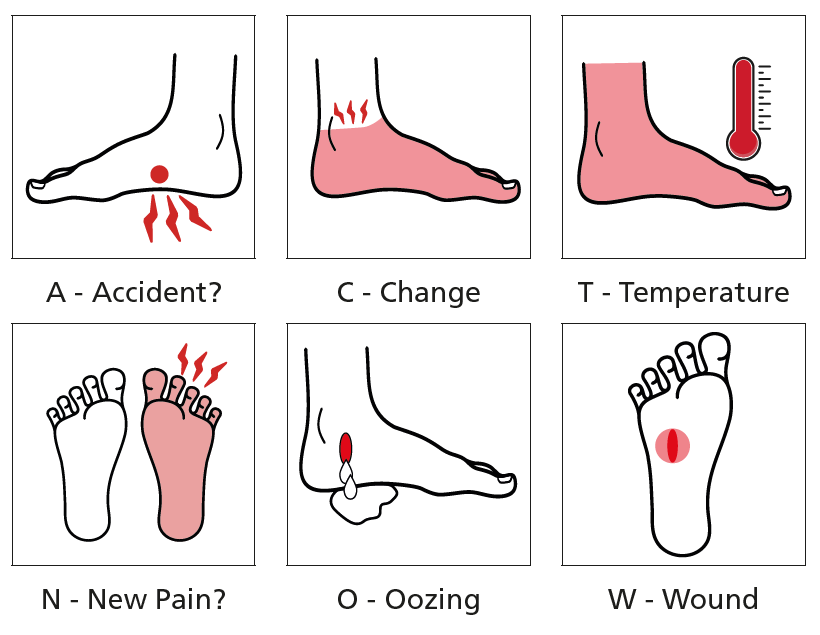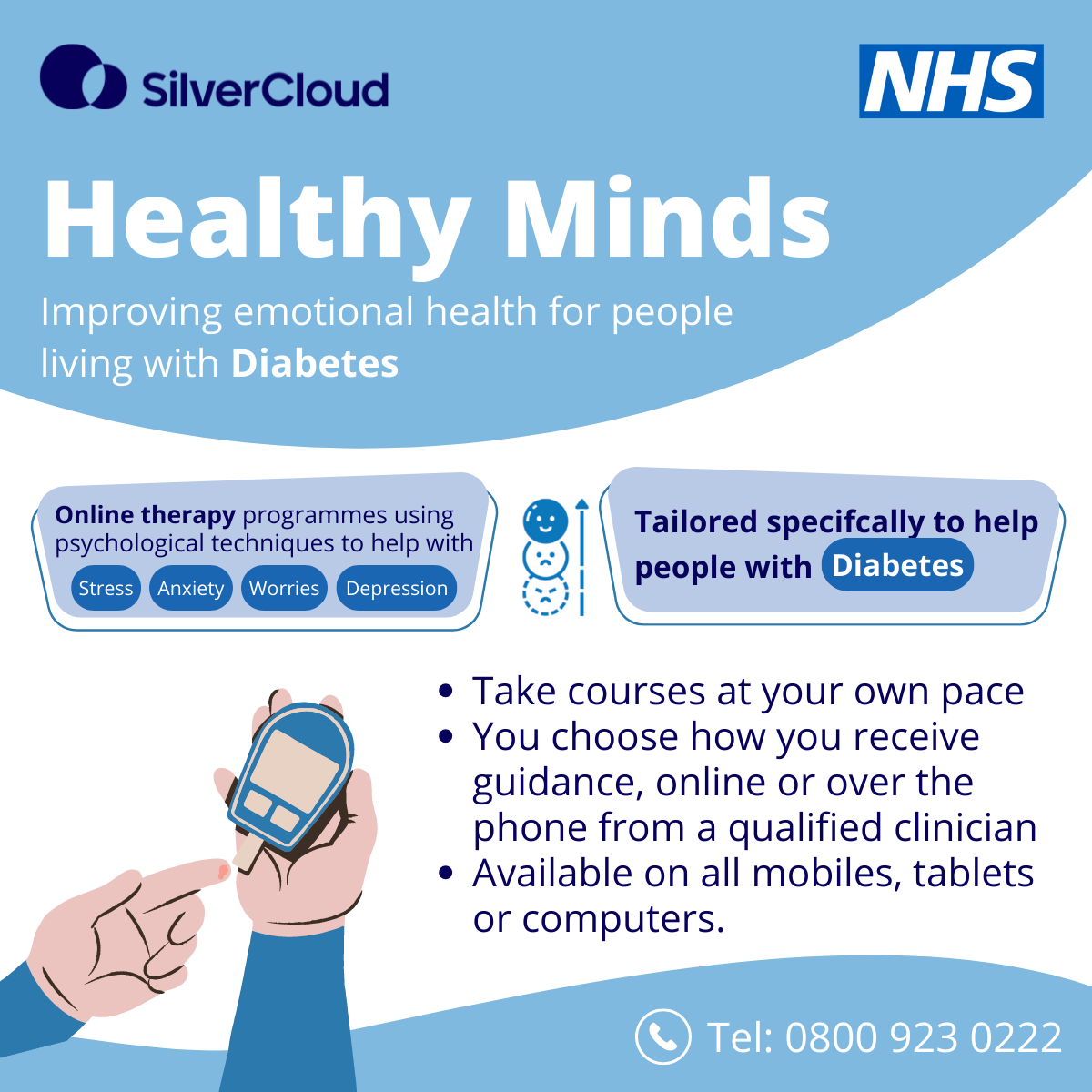There is a range of information to support you to live well with diabetes. Find a selection of tools and resources hand-picked by our local health and care professionals.
Diabetes UK
Diabetes UK offers a large range of information to help you live well with your condition including:
- eating healthily as well as recipes
- advice about driving
- emotional wellbeing
- treatments.
You can also join the Learning Zone for advice on what to eat and tips for managing diabetes day-to-day.
You need certain health checks when you have diabetes
You might hear this called your 'annual review', but you don’t always get these once a year. Here’s what to expect:
When you were diagnosed with type 2 diabetes, you should have had the following conversations and checks with your healthcare team.
- A review of your medical history and anything going on in your personal life that might affect your diabetes.
- A referral to a diabetes group education programme that works for you and your cultural background, or the same type of education in a one-to-one appointment if you prefer.
- If it’s right for you, a discussion about weight management or weight loss and type 2 diabetes remission, which is when your average blood sugar levels are no longer in the range for diabetes and you don’t need medication.
- A review of your emotional wellbeing and mental health needs.
- A review of your medication.
- A summary of your agreed diabetes management plan and when it should be reviewed again.
- Information about the medical exemption form for free prescriptions if you live in England. You don’t need this in Northern Ireland, Scotland, and Wales as prescriptions are free for everyone.
Source: Diabetes UK, published March 2024, charity number 215199
At diagnosis and then at least once a year, everyone with type 2 diabetes should have the following checks and appointments.
- An HbA1c test, which checks your average blood sugar levels over the last three months.
- A blood pressure check, a weight check, a cholesterol test to check your blood fats, and blood and urine tests to check how well your kidneys are working.
- An eye screening appointment to check for signs of diabetic retinopathy, which is a complication of diabetes. But this might be every other year if your previous checks were fine.
- A foot check to make sure you don’t have problems with nerves or circulation in your feet. This may be once every other year if you live in Scotland and are at low risk of foot problems.
- Advice about your diet from a dietitian, and weight monitoring.
- A review and update of your agreed diabetes management plan.
- A review of the diabetes knowledge you already have and would like to have.
Source: Diabetes UK, published March 2024, charity number 215199
When you are eligible for diabetic eye screening, you will receive an invitation by letter with a list of screening locations close to your postcode so you can choose where the screening will be carried out. You can also see this list online, and read more about your eye screening appointment.
Read more information explaining the NHS diabetic eye screening programme from gov.uk
Looking after your feet
Diabetes can increase the risk of foot complications. It is important people with diabetes are aware of the risks and know when to seek advice or get assessed by a podiatrist or urgent care facility.

- new open wound
- foot injury
- discharge or smell from a wound
- pain throbbing or soreness
- red, hot, swollen, or painful, with or without a wound
- changes in foot shape or colour
- any of the above and flu-like symptoms.
If you develop any of these danger signs and symptoms please act now and contact the diabetic foot team immediately. You can also contact your GP practice, urgent care centre or accident and emergency department, explaining you have diabetic foot problem and are at risk of serious foot complications. If you notice a wound, please dress with a sterile dry dressing and try to keep weight off the area until seen by a health professional.
Contact your local diabetic foot team
For any urgent foot problems, please contact your local diabetic foot team. You can find their details on your footcare card which was provided at your diabetes checkup at your GP practice, or see below:
| Area | Call | |
|---|---|---|
| Dudley | 01384 244594 | dudley. |
| Sandwell | 0121 507 4104 | swb-tr. |
| Walsall | 01922 270382 | diabetesfeet. |
| Wolverhampton | 01902 695310 | rwh-tr. |
- always initiate non-weight bearing/offloading
- swab wound (if present): deep wound swab ideally with some tissue, post debridement
- order X-ray (weight bearing X-ray if Charcot suspected) initiate wound management
- administer antibiotics according to foot clinic protocol
- alert vascular team if arterial insufficiency suspected
- achieve optimal glucose levels.
Gain advice from and make an urgent referral to the diabetes foot specialist team within 24 hours.
Differential diagnosis
- Charcot
- Fracture or Sprain
- Osteomyelitis or
- Cellulitis
- Gout
- Ulcer
- Severe Neuropathy
- Critical Ischemia or
- Gangrene
If you experience any other foot problems, such as:
- ingrowing toenail (for removal)
- rheumatoid arthritis with foot pain
- foot wounds and ulcers
- nails, callus, corns
- foot pain whilst walking/standing
- neurological conditions
- leg/foot circulation problems
Please complete the self-referral form for the area in which your GP practice is based:
- Dudley - complete this self-referral form
- Sandwell - complete this self-referral form
- Wolverhampton - complete this self-referral form
- Walsall - complete this online self-referral form or contact the Podiatry Team on 01922 270380 or feet.
walsall for support@nhs.net
- Touch the toes test
- Diabetes and looking after your feet information leaflet from Diabetes UK
- Looking after your feet when you have diabetes - download the leaflet from trend diabetes
Support for people with diabetes and mental health conditions

It offers online support to people struggling with mild anxiety or depression and can also be supported by and NHS therapist who will follow your progress and provide regular support and guidance through messaging in the programme or by telephone calls along the way.
If you are experiencing symptoms of stress, anxiety or low mood and would like to try online support you can self refer to SilverCloud online therapy programme.
You can find out more about Black Country Healthcare NHS Foundation Talking Therapy and Healthy Minds service by visiting: www.




